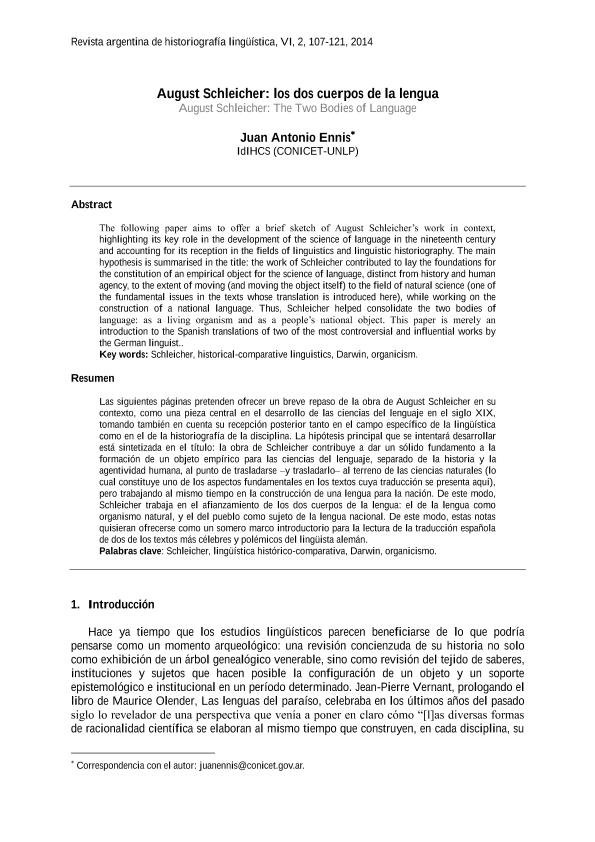Mostrar el registro sencillo del ítem
dc.contributor.author
Ennis, Juan Antonio

dc.date.available
2016-12-01T17:36:04Z
dc.date.issued
2014-08
dc.identifier.citation
Ennis, Juan Antonio; August Schleicher: los dos cuerpos de la lengua; Universidad de Buenos Aires. Instituto de Lingüítica; Revista argentina de historiografía lingüística; 6; 2; 8-2014; 107-121
dc.identifier.issn
1852-1495
dc.identifier.uri
http://hdl.handle.net/11336/8586
dc.description.abstract
Las siguientes páginas pretenden ofrecer un breve repaso de la obra de August Schleicher en su contexto, como una pieza central en el desarrollo de las ciencias del lenguaje en el siglo XIX, tomando también en cuenta su recepción posterior tanto en el campo específico de la lingüística como en el de la historiografía de la disciplina. La hipótesis principal que se intentará desarrollar está sintetizada en el título: la obra de Schleicher contribuye a dar un sólido fundamento a la formación de un objeto empírico para las ciencias del lenguaje, separado de la historia y la agentividad humana, al punto de trasladarse –y trasladarlo– al terreno de las ciencias naturales (lo cual constituye uno de los aspectos fundamentales en los textos cuya traducción se presenta aquí), pero trabajando al mismo tiempo en la construcción de una lengua para la nación. De este modo, Schleicher trabaja en el afianzamiento de los dos cuerpos de la lengua: el de la lengua como organismo natural, y el del pueblo como sujeto de la lengua nacional. De este modo, estas notas quisieran ofrecerse como un somero marco introductorio para la lectura de la traducción española de dos de los textos más célebres y polémicos del lingüista alemán.
dc.description.abstract
The following paper aims to offer a brief sketch of August Schleicher’s work in context, highlighting its key role in the development of the science of language in the nineteenth century and accounting for its reception in the fields of linguistics and linguistic historiography. The main hypothesis is summarised in the title: the work of Schleicher contributed to lay the foundations for the constitution of an empirical object for the science of language, distinct from history and human agency, to the extent of moving (and moving the object itself) to the field of natural science (one of the fundamental issues in the texts whose translation is introduced here), while working on the construction of a national language. Thus, Schleicher helped consolidate the two bodies of language: as a living organism and as a people’s national object. This paper is merely an introduction to the Spanish translations of two of the most controversial and influential works by the German linguist.
dc.format
application/pdf
dc.language.iso
spa
dc.publisher
Universidad de Buenos Aires. Instituto de Lingüítica
dc.rights
info:eu-repo/semantics/openAccess
dc.rights.uri
https://creativecommons.org/licenses/by-nc-sa/2.5/ar/
dc.subject
Schleicher
dc.subject
Lingüística Histórico-Comparativa
dc.subject
Darwin
dc.subject
Organicismo
dc.subject.classification
Lingüística

dc.subject.classification
Lengua y Literatura

dc.subject.classification
HUMANIDADES

dc.title
August Schleicher: los dos cuerpos de la lengua
dc.title
August Schleicher: The Two Bodies of Language
dc.type
info:eu-repo/semantics/article
dc.type
info:ar-repo/semantics/artículo
dc.type
info:eu-repo/semantics/publishedVersion
dc.date.updated
2016-11-03T19:15:37Z
dc.journal.volume
6
dc.journal.number
2
dc.journal.pagination
107-121
dc.journal.pais
Argentina

dc.journal.ciudad
Buenos Aires
dc.description.fil
Fil: Ennis, Juan Antonio. Consejo Nacional de Investigaciones Científicas y Técnicas. Centro Científico Tecnológico La Plata. Instituto de Investigaciones en Humanidades y Ciencias Sociales; Argentina. Universidad Nacional de La Plata. Facultad de Humanidades y Ciencias de la Educacion; Argentina
dc.journal.title
Revista argentina de historiografía lingüística
dc.relation.alternativeid
info:eu-repo/semantics/altIdentifier/url/http://www.rahl.com.ar/index.php/rahl/article/view/81
dc.relation.alternativeid
info:eu-repo/semantics/altIdentifier/issn/1852 - 1495
Archivos asociados
